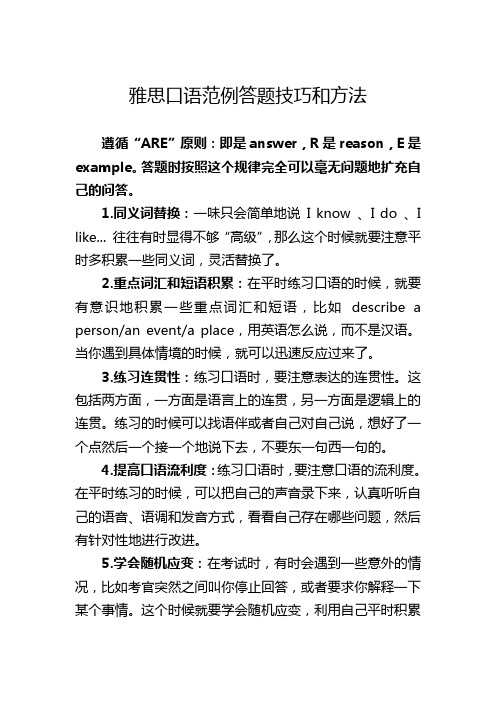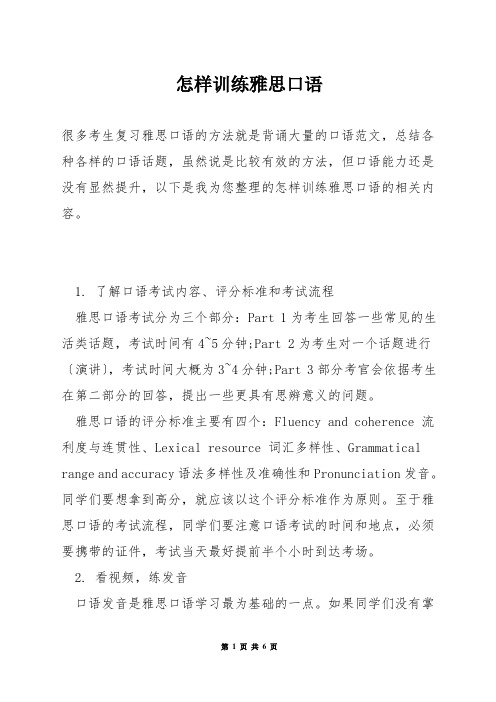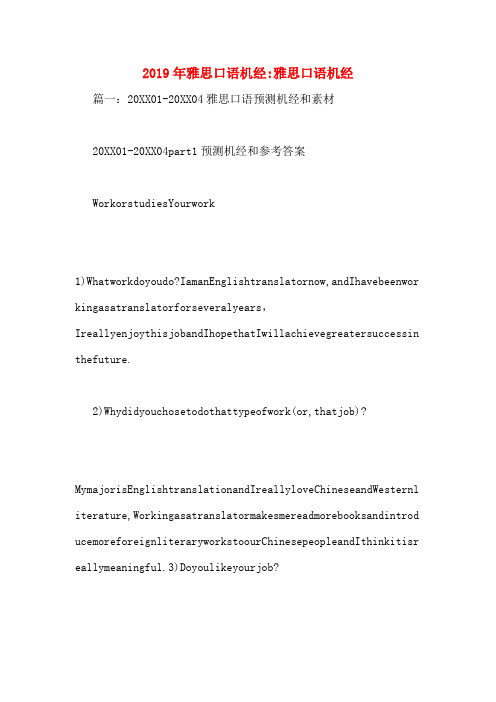雅思口语机经怎样利用
雅思口语范例答题技巧和方法

雅思口语范例答题技巧和方法
遵循“ARE”原则:即是answer,R是reason,E是example。
答题时按照这个规律完全可以毫无问题地扩充自己的问答。
1.同义词替换:一味只会简单地说I know 、I do 、I like... 往往有时显得不够“高级”,那么这个时候就要注意平时多积累一些同义词,灵活替换了。
2.重点词汇和短语积累:在平时练习口语的时候,就要有意识地积累一些重点词汇和短语,比如describe a person/an event/a place,用英语怎么说,而不是汉语。
当你遇到具体情境的时候,就可以迅速反应过来了。
3.练习连贯性:练习口语时,要注意表达的连贯性。
这包括两方面,一方面是语言上的连贯,另一方面是逻辑上的连贯。
练习的时候可以找语伴或者自己对自己说,想好了一个点然后一个接一个地说下去,不要东一句西一句的。
4.提高口语流利度:练习口语时,要注意口语的流利度。
在平时练习的时候,可以把自己的声音录下来,认真听听自己的语音、语调和发音方式,看看自己存在哪些问题,然后有针对性地进行改进。
5.学会随机应变:在考试时,有时会遇到一些意外的情况,比如考官突然之间叫你停止回答,或者要求你解释一下某个事情。
这个时候就要学会随机应变,利用自己平时积累
的知识和经验来应对这些情况。
英语口语考试的人机对话技巧

【导语】英语采⽤计算机进⾏考试,符合信息化时代中改⾰的要求。
⽽且现在的英语教学⼤纲要求全⾯发展学⽣的语⾔能⼒。
以下是整理的英语⼝语考试的⼈机对话技巧,欢迎阅读!1.英语⼝语考试的⼈机对话技巧 1、熟悉试题,快速选择 答好听⼒题的重要前提和保证是在听录⾳之前阅读试题。
开始听⾳前的五分钟,要看清⼤⼩题⽬要求和每个题⽬的问题与选项,绝对不能放过任何⼀个细节。
在浏览问题和选项时,要尽可能对⽂章内容和试题答案进⾏预测,听录⾳时只要验证⾃⼰的预测就可以了。
同时,由于选项和试题⾥的短语、句⼦极有可能在听⼒内容⾥再现,因此,认真读题还可以提⾼听⾳的效果。
听完每⼀⼩题之后,要尽快选定答案,这样可使⾃⼰处于主动地位。
如果每⼀题都是先听后看,则有可能辈牵着⿐⼦⾛,疲于应付。
同时,切记不要⼀边听下⼀句的录⾳,⼀边想着前⼀句的内容或眼睛仍看着前⼀句的选项,结果造成⼀错再错,⼤⼤影响考试情绪。
听⼒部分答题之后,有⼀分钟时间修改答案。
2、合理分配,不要抢答 在做听⼒时,要充分利⽤两题之间的停顿时间,快速有效地阅读题⽬。
这样在听录⾳时就可以缩⼩注意的范围,把注意⼒集中在与所提问题有关的关键词上,减少盲⽬性,加强针对性。
如所提问题是有关时间的,就可以在听录⾳时特别注意出现的时间,从⽽做出正确的选择。
在做⼝语部分的朗读短⽂和话题简述时,千万不要抢答。
听到“开始录⾳”的提⽰、看到麦克风图标和录⾳进度条后,在开始答题。
如果抢答,将会影响分数。
考⽣⽤⼝语答题时,如果没有表达好⼀个句⼦,可以⽴即修改重说,不会影响考⽣的得分;但如果考⽣答题过程中修改太多,将会影响考⽣的流利性得分。
3、注意事项 听⼒和⼝语作为语⾔能⼒学习中不可少的成员,已经⼴泛⽽深⼊地⾛进中考和⾼考。
中考英语听⼒和⼝语测试的要求在逐年提⾼,测试范围在逐渐扩⼤。
因此,如何加强平时的听说模拟训练、提⾼听说能⼒、适应⼈机对话,成为了⼴⼤师⽣关注的焦点。
只要我们熟悉要求,注重听说能⼒的培养,加强模拟训练,⼀定能尽快适应英语⼝语⼈机对话考试。
怎样训练雅思口语

怎样训练雅思口语很多考生复习雅思口语的方法就是背诵大量的口语范文,总结各种各样的口语话题,虽然说是比较有效的方法,但口语能力还是没有显然提升,以下是我为您整理的怎样训练雅思口语的相关内容。
1. 了解口语考试内容、评分标准和考试流程雅思口语考试分为三个部分:Part 1为考生回答一些常见的生活类话题,考试时间有4~5分钟;Part 2为考生对一个话题进行〔演讲〕,考试时间大概为3~4分钟;Part 3部分考官会依据考生在第二部分的回答,提出一些更具有思辨意义的问题。
雅思口语的评分标准主要有四个:Fluency and coherence 流利度与连贯性、Lexical resource 词汇多样性、Grammatical range and accuracy语法多样性及准确性和Pronunciation发音。
同学们要想拿到高分,就应该以这个评分标准作为原则。
至于雅思口语的考试流程,同学们要注意口语考试的时间和地点,必须要携带的证件,考试当天最好提前半个小时到达考场。
2. 看视频,练发音口语发音是雅思口语学习最为基础的一点。
如果同学们没有掌握正确的发音,那么在用〔英语〕表达的时候,就难以正常的〔沟通〕交流,因为别人听不懂你的话,你也听不懂别人的话。
所以同学们一定要将口语正确发音的基本功夯实了。
最有效的方法就是多看多听多练了。
3. 搜集整理口语话题题库和素材除了发音这个难点,考生在口语备考中的另一个难题就是各种各样话题。
虽然口语考试的话题难度不是很大,但是英语毕竟是一门〔外语〕,同学们想要对各种话题都能够自如的交流,还是必须要下一番苦功的。
话题的搜集大家可以参照近期的雅思口语机经猜测,里面不仅有经典的高频考题,还有最新出现的雅思口语题目。
4. 自问自答在家自学雅思口语的方式。
同学们可以提前准备好一个话题,设置一些提问,然后通过自问自答的方式来模拟考试场景。
为了能及时发现自己的错误,同学们可以将自己的学习对话录下来,看看自己的发音、语法、表达是否有误。
雅思口语考试时间 怎样分配口语时间

时间安排雅思口语考试有6个部分,所以雅思口语时间是比较长的,那么如果做好雅思口语时间分配呢?首先我们看下雅思口语的6个问题,分别该怎么进行雅思口语时间分配:第1题:准备15秒,说45秒。
第2题:准备15秒,说45秒。
第3题:阅读+听力,讨论学校方面的话题,不需要加入自己观点。
读45s,听60s,准备30s,说60s。
第4题:阅读+讲座,教授套用例子,不需要加入自己观点。
读45s,听60s---90s,准备30秒,说60秒。
第5题:听力,总结问题,出主意,要自己选观点说体验。
听60-90秒,准备20s,说60s。
第6题:讲座,复述一遍教授的总分总结构,不需要自己的观点。
听60-90s,准备20s,说60秒。
对于那些刚刚接触雅思口语的同学们来说,口语部分也许是比较难啃的一块大肉。
由于国内的应试教育,导致了很多人学的都是‘哑巴英语’。
面对雅思口语使他们不知道说什么从何说起。
这就需要我们在平时的时候加强对话题的拓展和训练。
大家都知道IBT考试的口语部分通常都是取材于北美大学学生日常学术和校园生活的许多方面,要求学生可以熟练地理解别人的思路并表达出自己的看法。
读/听 /说题目和听/说题目都要求考生充分理解相关的题目材料,对考生的口语能力和临场应变能力较高。
每道题目回答时间不超过一分钟,这要求考生的语言运用要高度归纳并精练准确。
雅思口语考试是电脑录音,评判者是通过听录音来做分数评估的,所以,说得快未必是件好事,说得清楚才是重点。
考虑到评卷者可能会产生的听觉疲劳,所以考生们表述时不要一味求快,而要注意断句、重音和语调。
备考规划备考2-3月:"知己"而"不知彼"经过一段时间的准备,考生逐渐知道了自己什么能够说,什么说不了,什么主题是自己能够驾驭的,什么主题是自己不能的,所谓"知己"了八分。
而这个备考阶段当中,"知彼"是我们考生极其重要的工作。
误区:"盲从网络经验,忽视客观标准"在大略了解自己的实际水平,打好语音、词汇、句型基础以后,很多考生,尤其是感觉较好的考生,就着手从网络上搜集所谓的"机经"模仿他人思路写稿,背诵。
雅思口语机经解析--擅长做饭的人

雅思口语机经解析----擅长做饭的人Cue cardExample:The person I wanna talk about who is quite good at cooking is my uncle. Until now, he has been working in a luxury restaurant as a chef; meanwhile, he is conducting a café with his friends in the downtown. He’s capable of creating distinctive dishes especially some Chinese classical ones like braised fish with soy sauce and stewed pork ribs with sugar and vinegar.When it comes to Chinese traditional festivals, families usually get reunion, no matter what kinds of food he made are always welcomed and were eaten up immediately. He is called the super cook in my family. Besides, he has won several championships in cooking competitions in the past few years. The special dish he’s quite good at is the braised fish with soy sauce, which is made of fresh fish with some Chinese traditional raw materials such as garlic, ginger and leek. After about 20 minutes braised, soy sauce will be added which colors the fish and stimulate the original flavor of the fish. Additionally, the café he’s running is often full of customers especially during the weekends and public holidays.That’s why I believe that he’s a super cook.Part 3How often do Chinese people cook at home?Traditionally, most Chinese people cook every day for breakfast, lunch and dinner. People who often eat at the restaurant may have a better income than those who work in the factory. Certainly, it’s much cheaper to cook at home. Only on certain important days, the family will havea big dinner at the restaurant.However, in recent years, more and more people have their meals outside especially the youngsters. For the main reason is that they have no choice but eating outside such as at schools or near their workplace. In many sophisticated cities in China, people don’t have time to prepare breakfast and lunch at home so that they have to eat outside. Besides, with the increasing level of people’s living standard, they will spend more time with their friends or families at the restaurant after work or at the weekends.•There are more restaurants these days, do you think people will eat out more?Definitely! There’s no doubt that the increasing number of the restaurant indicates the growing needs of the market. With the rise of people’s salary, eating outside has become common which results in a diversity of restaurants coming out, which are famous for different cuisines. Additionally, several special cafés endorsed by celebrities, has become popular in China especially welcomed by the young people. In my perspective, eating outside seems to be a social behavior since business is usually conducted during the dinner.•Do schools have cooking classes in your country?Generally speaking, there are no this cooking lessons in schools except the training centers or the vocational colleges. In China, there is only one child in most families which means that parents won’t allow their child to do any housework including cooking. Therefore, it’s hard to imagine that cooking could be a course in schools.While, for those who are fond of cooking, they can attend the vocational colleges where professional courses will be approached and of course, cook is a prospect job after graduation.•Do you think we should teach children how to cook?I think so. In my perspective, cooking is a kind of survival skill especially for young people. Children had better learn to make some simple dishes to take care of themselves in case their parents aren’t with them. Besides, cooking is an essential ability for teenagers who intend to study overseas because of the different eating habits. What’s more, eating at homing is relatively healthier than eating outside for the fresh raw materials and the process made by oneself.。
9-12雅思口语完全机经 最终版

前言:绿色话题为本季度新出现的题建议重点复习,Part 1 and 2 话题相当准确! Part 3的题目供参考(因为part 3 是考官临场发挥问,随机度太大)祝烤鸭们考试顺利!Part 1Your WorkorYour StudiesDo you work or are you a student?1a)Your Work1. What work do you do?2. Why did you choose to do that kind of work?3. Do many people in your country choose to do that type of work?4. What are your responsibilities at work?5. Do you remember your first day at work?6. What did you do on your first day at work?7. Did you like your first day at work?8. (Similar to above) How did you feel on your first day at work?9. Do you think the first day at work is important?10. (Similar to above) Do you think a person's first impressions of a new job are important?1b)Your Studies1. What subject(s) are you studying?2. Why did you choose to study that? /Why did you choose to study those subjects?3. Do many students in your country study that subject?4. (Similar to above) Is that a popular subject to study in your country?5. What school/university do you attend?6. Why did you choose that school/university?7. What do you plan to do after you finish your studies?8. Your First Day at University9. Did you like your first day at university?10. (Similar to above) Did you have a good first day at university?11. (Similar to above) How did you feel on your first day at university/high school?12. Do you think the first day at university is important?13. How important do you think it is for people to have an enjoyable first day at university (or, school)?14. (Similar to above) Do you think a person's first impressionsof a new school or university are important?Your Hometown1. What's (the name of) your hometown (again)?2. Is that a big city or a small place?3. Please describe your hometown a little.4. How long have you lived there?5. Do you like it?6. Do you like living there? *7. What do you like (most) about your hometown?8. Is there anything you dislike about it?9. Do you think you will continue living there for a long time?10. Do you plan to continue living there?11. Where would you like to live? *Your Home(Your Accommodation)1. Canyou describe the place where you live?2. What do you usually do in your house/flat/room?3. Are the transport facilities to your home very good?4. Please describe the room you live in.5. Is there anything you don't like about the place where you live?6. What kind ofdecorations does it have?7. How do you think this room could be improved?8. What can you see when you look out the window of your room?9. How well do you know your neighbors?10. What kind of people are your neighbors?11. Do you spend much time socializing with your neighbors in your neighbors' homes?12. Do you like the environment where you live?13. Would you say the place where you live is good for families with children?14. In the future, what type of place would you like to live in?15. What kind of neighborhood/environment/surroundings would you like to live in?Shoes1. Do you like shopping for shoes? (Why? / Why not?) *2. How often do you buy shoes?3. How long is it since you bought some shoes?4. What kinds of shoes you usually buy? (or, prefer to buy)5. Do you prefer comfortable shoes or good-looking shoes?Colours1. Do you have a favourite colour? (Why is that your favourite colour?)2. Was that also your favourite colour when you were a child?3. Were colours important to you when you were a child?4. Did you wear bright coloured clothes when you were young?5. Do you prefer light colours or dark colours?6. Do you prefer light colours or bright colours?7. What colour would you choose to paint the walls of your room?8. What colour car would you choose to buy?Housework1. Do you like doing housework?2. How do you think housework could be made more interesting?3. Did your parents ask you (or, make you) do any housework when you were a child?4. Do you think children should do some housework?5. Which do you think is better for doing housework, a machine (or, a robot) or a person?6. Which do you think can do housework better, a machine (or, a robot) or a person?7. In the future, do you think machines will replace humans for doing housework?Teachers1. Do you (or, did you) have a favourite teacher?2. Why do you like him/her?3. How does (or did) this teacher help you?4. Do you think you could be a teacher?5. Would you like to be a teacher?Writing1. Do you often write things?2. Do you write everyday?3. When do you need to write?4. Do you like writing?5. What do you usually write?6. How many hours a day do you spend writing?7. Do you think writing is important?8. Do you like writing to people?9. Do you write letters very often?10. Do you think you (one) can judge someone's personality by looking at their handwriting?Friends1. What do you usually do with your friends?2. How long have you known your best friend?3. When will you see him/her next?4. What do you (and your best friend) usually do together?5. Which do you think is better, to have many friends or just a few close friends?6. Are most of your friends from school (or university) or from outside school (or university)?7. (Similar to above) Are most of your friends from your work or are they not connected with your work?8. Do you prefer to spend time with your relatives (or family), or your friends?9. Do you think friendship is important?10. Do you like to spend time with friends? (Why?)11. Do you prefer to spend time with friends or spend time alone? (Why?)12. Are friends more important than family? (Why?)13. What kind of people do you like to have as friends?Natural Places1. Do you like visiting natural places? *2. What are some well-known natural attractions in your country?3. Have you ever gone camping?4. Do you like a natural environment?5. How do city kids in your country have contact with nature?6. Do you have any memories of nature from your childhood?7. What are the benefits of learning about nature?8. What can people get from going to natural places?History1. Do you like (to learn about) history?2. What historical event do you find most interesting?3. What historical event do you think was most important?4. Do you think history is important?5. Do you like to watch programs on TV about history?6. How do you get information about history?7. Do you think you can (really) learn history from films and/or TV programs?8. Do you think the internet is a good place to learn about history?9. Can you name a person from history who you would like to learn more about?10. Why would you like to learn more about him/her?Advertising1. Are there many advertisements in your country2. Why do you think there are so many advertisements now?3. What are the various places where we see advertisements?4. How do you feel about advertisements?5. What kind of advertisement do you like the most?6. Do advertisements (ever) influence your choice about what to buy?7. Where can we see advertisements?8. Do you like advertisements on TV?9. Do you prefer advertisements on TV or those in magazines?10. Do you think advertising plays a very important role in today's world?11. What sorts of advertisements leave the deepest impression on people?12. What do you think about the developments in advertising in China today?13. Why do you think companies advertise themselves (or, their products)?Public Holidays1. What public holidays do you have in your country? *2. Do people in your country celebrate Christmas?3. Do you like public holidays?4. Which public holidays do you like the most?5. What did you do during the last public holiday?6. What do other people in your country usually do on public holidays?7. What would you like to do during the next public holiday?8. Do you think public holidays are important?9. Do you think there should be more public holidays in your country?Weather & Seasons1. What's the weather (or climate) like in your hometown?2. Would you say the weather in your hometown is generally good, or bad weather?3. How are the (four) seasons different in your hometown?4. Which season do you like the best (or, the most)?5. Would you prefer to live in a place with one season all year round, or four different seasons?6. Would you say there have been any changes in the weather (in your hometown) in the recent past?7. Does the weather have much impact on your life?8. Do you often talk about the weather with your friends?9. What sort of climate do you prefer?10. Do you like extreme climate? (Why?/Why not?)Travel1. Do you like traveling?2. In which season do you prefer to travel?3. Would you say your country welcomes travelers (or, tourists)?4. Would you say your country is a good place for travelers (or, tourists) to visit?5. What are some problems travelers meet on their trips?6. What are ideal places in your country for people to go to?7. What are the benefits of traveling?8. How do people travel around in your country?Concentration1. Do you prefer to study in a silent environment or in a place that has some noises (or sounds)?2. What do you do if there's too much noise (and you want to study)?3. When (or, at what times)do you find it easiest to concentrate? (Why?)4. What times in your life do you need to concentrate on doing something?5. Does your job require concentration and attention to detail?6. Is it difficult/easy to concentrate? (Why?)7. What affects your ability to concentrate?8. What type of environment do you need to work peacefully?9. Do you (ever) do anything to help you concentrate?10. Do you think people can do two things at the same time?Neighbours1. Do you have many neighbours?2. Would you say your neighbourhood is a suitable place for families with children to live?3. Do you know your neighbours?4. Do you like your neighbours?5. What do you think of your neighbours?6. How often do you see (or talk to) your neighbours?7. Does you think it's important for a person to have a good relationship with their neighbours?8. In what ways can neighbours help each other?9. Have you ever asked a neighbour for help?10. What sorts of problems (conflicts) can people have with their neighbours?11. Would youprefer to have young people as your neighbours, or old people?Cars1. Do you like traveling by car?2. When was the last time you traveled by car?3. Do you think it's important to have a driver's license?4. Do you like cars?5. Do you have a driver's licence?6. Have you ever driven a car?7. Do you (or your family) have a car?8. Do you often drive it?9. (If you don't have a car) Do you plan to buy a car in the future?10. If you wanted to buy a car, what kind of car would you choose?11. What kinds of cars are most popular in your country?12. Do you like traveling by car?13. Who do you prefer to travel with?14. Do you like to take long trips in a (your) car?15. Is there anything you don't like about cars?Noise1. Do you prefer to study in a silent environment or in a place that has some noises?2. What do you do if there's too much noise?3. Are you ever bothered by noise?4. Where can you hear loud noise?5. Do you think there is more noise in people's lives today than in the past?6. Do you think there ismore noise in cities today than there was in the past?7. Do you think that cities will become noisier in the future?8. What sounds do you like?9. What sounds do you dislike?10. Are there any particular sounds that you like or dislike?11. What sounds remind you of your childhood?Museums and Art Galleries1. Do you like visiting museums and art galleries?2. What did you learn from visiting these places?3. Do you think schools should take their students to visit museums and art galleries?4. When you were a child, did you ever visit any museums?5. Would you recommend that schools take their students to visit museums (or, that museum)?6. What do you think is the role (or the purpose) of museums and art galleries?7. What can people learn from visiting museums and art galleries?Street Markets1. Dou you like visiting street markets?2. Do you think street markets are good for people?3. Why do people sometimes prefer to shop at a street market rather than in normal shops or shopping malls?4. What do you think are the differences between a street market and a supermarket?5. Would you like to visit a street market in a foreign country?Maps1. Do you (ever) use a map?2. When do you use a map?3. Who taught you how to use a map?4. (Similar to above)How did you learn to use (or read) a map?5. Do you prefer to use electronic maps or those made of paper?Gifts1. Do you like to receive gifts?(Why?/ Why not?)2. What kind of gifts do you like to receive?(Why?)3. What gifts did you receive in your childhood?4. Do you like giving gifts to people?(Why?/ Why not?)5. What gifts did you give to others in your childhood?6. Do you often receive gifts?7. Do you like receiving presents?8. What's your favourite (or, the best) gift you have ever received?9. What was the last gift your received?10. Have you ever received a gift that you dislike(d)?11. Is there anyone you'd like to give a present to?12. Do you find it hard to choose gifts for people?13. Do you prefer to give a gift or to receive one?14. In your country, when do people give gifts to others?15. Do you think flowers are good gifts?Leisure Time (or, Days of the Week)1. Which is your favourite day of the week?2. How many days off do you have every week? *3. Do you usually have days off together or are they separated (by work/attendance at class)?4. When do you have free time?5. How do you like to relax? (What’s your favourite way to relax?)6. How do you relax?7. Do you have any hobbies or interests?Parks1. Do you often go to a park (or, parks)?(Why?/ Why not?)2. Who do you usually go there with?3. When was the last time you went to a park?4. Does your hometown have many parks?5. Do you often visit public parks?6. What do you usually do there?7. Do you like parks?8. What kinds of parks do you like?9. What do you like most about (going to) a park?10. Did you go to parks when you were a child?11. What did you do there?12. Do you think it's good to have parks and public gardens in cities? (Why?)13. Do you think there should be more of them?14. Do you think you will go to parks more often in the future?Food1. What's your favourite food?2. When do you usually eat that food?3. What was your favorite food when you were a child?4. Did that change when you became an adult?5. Is food important to you? (Why?)6. What foods do you usually eat?7. What kind(s) of food do you particularly like?(Why?)8. How often do you eat that?9. When was the last time you ate that?10. If youhadchildren, what foodswouldyou recommend they eat?11. (Similar to above) In the future, if youhavechildren, what foodwillyou recommend they eat?12. Do you usually make that yourself or do you usually buy it?13. Do you always (or, usually) eat the same food every day?14. Is there any food you don’t like? (Why?)Toys1. What was your favorite toy when you were a child?(Why?)2. Do you like toys?3. Are toys very important to you?4. What sorts of people like toys?5. Did your parents give it toyou?6. Do you still have any of your old toys?7. Can you suggest why some people like to keep a childhood toy?8. Why do some people like to keep a toy from their childhood?9. What kind of toys do children like today?10. If you had a child, what toy would you buy himor her?11. Do you think toys should be passed on to other kids when these toys are no longer wanted?Photography1. Do you like to take photographs?(Why?)2. Do you think it is better to take photos using a camera or a mobile phone?3. (Similar to above)Do you prefer to take photos using a camera or a mobile phone?4. What do you most like to take photos of?5. What do you do with your photos after you have taken them?6. Do you ever share your photos with other people on the internet?Part 2& 3 People人物An old personDescribe an older person who you respectWho it isHow you knew him / herWhat kind of person he/she isWhy you respect themPart 3What do you think is the difference (or, are the differences) between the young and the elderly?Do you think we should respect old people?In what ways can people show respect to old people?Do you think old (or, older) people like being asked for their advice by young people?Do you think young people should always do what the older people say they should do?Why is it that many young people don't want to listen to what older people say? Do you think young people have a responsibility to take care of old people? Who do you think should take care of those old people who need care? Should the family look after their elderly members, or the government?Do you think old people should live alone at home?How can we solve the problem of housing old people who are alone?An athleteDescribe a famous sports star that you likeWho it isWhat kind of sport theydoHow you knew him / herWhy are they famousPart 3What kind of sport is the most popular in your country?Do people in your country prefer to participate in sports or to watch sporting competitions?Are there any differences between sports that men play and those that women play?Do people prefer playing sport for fun or playing in serious competition?Some people believe that the top professional sportspeople are overpaid. Do you agree?Do children in your country play any sports?Is it good for children to play various types of sport?Do you think it's important for children to take part in sporting activities?Do you think it's better for children to play sport just for fun or to compete seriously?Do children in your country have enough time for sport?Someone You Would like to be Similar ToDescribe a person who you would like to be similar to.You should say:who this person ishow you know this personwhat impresses you about this personand explain why you would like to be similar to this person.Part 3What are some examples of good habits and bad habits that people have?How do we develop our habits?What good habits do you think children should develop (or, have)?How can parents cultivate good habits in their children?Why do some children develop bad habits?Do you think the stars of popular culture such as pop singers and film stars influence the habits of young people?Would you say this is a good thing? *Do you think this puts a lot of pressure on these stars (to be good models)?Do you think advertising in general has much influence on the habits of young people?A musical artistDescribe a band or singer that you likeWho it isWhat kind of music they playHow you knew him / herWhy do you like themPart 3Do you like singing?What are the qualities (or, factors) that define someone as a good singer?Do you think everyone (or anyone) can become a (good) singer?Do you think there are benefits from being able to sing well?Do you think the main goal of the music industry is to provide good music or to make money?How do you think the music industry will evolve (change, develop) in the future?A good looking personDescribe someone who you think is beautiful or handsomeWho it isWhat they look likeHow you knew themWhy you think he/she is good lookingPart 3Do you think many people care about the appearance of others (and themselves)?Which do you think is more important, a person's appearance or their inner qualities?We often see tall, thin models in (women's) magazines. What effect do you think that has on young women?Can you suggest why models like that are chosen to be in magazines and in fashion shows?Do you think models such as that sell more clothes?Which do you think is more beautiful, a city or a natural place? (Why?)What do you think the word, "beauty" means?A FriendDescribe one of your friends.You should say:who this person iswhat he or she looks likehow you metwhat you do together *and explain why you have remained friends.Part 3What do you think is the key to making friends?Do you think people make more friends today than people did in the past? Are these relationships closer than relationships in the past?Why do you think so many people make friends on the internet?A Successful PersonDescribe a person you know who you think is successful.OrDescribe a successful thing that a friend didYou should say:who he or she iswhat they didhow you know this personand explain why you think he or she is successfulPart 3How do people achieve success at school?How would you define the expression, "success at school"?Which do you think is more important, success with one's studies (academic success) or success in sport?If a school student wants to be a success at something, do you think it is better for them to focus on academic activities, artistic activities or sporting activities?Do parents in your country pay more attention to (or, give more value to) academic success or to some other example of success? (Why?)What do you think are the differences between success at school and in the wider society?Which do you think is more important, to learn academic skills or practical skills? What kinds of people are most likely to be successful in their work?In general, how do people judge (or, assess) the success (or otherwise) of others? Do you believe "being successful" and "making a lot of money" are the same thing?What factor is more important for success, talent or opportunity?Besides academic and job success, what do you understand "success in life" to mean?A Person who has an Interesting JobDescribesomeone you know who has an interesting job.You should say:who this person ishow you know this person *who he/she (they) got this jobwhatjob they doand explain why you think this person's job is interesting.Part 3In your country, what jobs (or, careers) are the most popular choices among young people?What job would you like to do?How do people choose their careers (or jobs)?How do people make their choice of career or the subject (the major) they study at university?Do you think it's easy (or difficult) for people to choose a career (or job)?Which do you think is more important when choosing a career (or job), the salary or what one is interested in? *How can a person stay interested in their job for many years?Is it easy for find a job in your country?In what occupations does your country have a shortage of workers?Why do many (or some) people want to work for the government?In what ways do you think big and small companies are different (and similar)? Do you think people have to do some study (or learn some skills) in order to get a good job?A Famous Foreign PersonDescribe a famous person (still living),not from your country, who you would like to meet.You should say:where this person comes fromhow you first learned about him or herwhy this person is famousand explain why you would like to meet this personPart 3Do you think everyone would like to be famous?Would you like to be famous? How do people become famous?What types of people become famous?How can a famous person maintain his or her fame?What kinds of famous people stay famous for a long time?Why do you think some people are famous just for a short time while others are famous for a long time (e.g., hundreds of years)?Do you think all famous people are wealthy?Do you think being famous is the same as being rich?Do you think famous people have much influence on young people?Place地点A Home You Would Like to Live InDescribe a home (e.g flat or house) that you would like to live in.You should say:where itwouldbewhat type of home itwouldbewho youwouldlike to live withand explain why you would like to live in this (kind of) home.Part 3How important to you is the locality and the surroundings of your house?Where (what types of places) do most people in your country prefer to live? What do you think about building a house in (or living in) the countryside?If you could only build your dream home in the countryside (not in the city), would you do it?Do people (in your country) prefer to live in cities or rural environments?Do you think the government should encourage more people to live in the countryside (or, away from big cities)?What do you think the government could do to attract more people to live in rural areas?Do you think rural people and city people have similar outlooks on life?Where do you think is the best place for old (e.g., retired) people to live?What kinds of home do people in your country live in?What do you think is the best type of home for families to live in?What are the advantages and disadvantages of living in a house compared to living in an apartment?A City You Have VisitedDescribe a city youvisitedorlivedin.You should say:when youvisitedtherewhy youwenttherewhat interesting places this city or townhadwhich time of the yearisbest for visiting this placeand explain how youfeltin that city.Part 3Why do many people want to live in cities?What are the pros and cons of living in a (big) city?Did most people live in cities in the past?Can you suggest why families with children tend to prefer living in a city?How are cities (in your country) different to cities in the past?In general, what types of people live in cities?What are some of the different reasons why people travel?Why do you think some people don't like traveling?Who do you think prefers to travel, young people or old people?A School You AttendedDescribe a school you have attended (in your childhood).You should say:what school it waswhat the classroomswerelikewhat the teacherswerelike *and explain how you felt about this school. *Part 3Which do you think is better, a big school or a small school?Which do you think is better, a big class or a small class?What age do you think is most suitable for children to start school?What do you think are the benefits of extra-curricular activities at school?Do you think it should be compulsory for all children to attend a school?Do you think it's better for high school-aged boys and girls to be educated together, or separately?Do you think school students today are overburdened?Is teaching a very popular profession in your country?Why do some people choose to (or, want to) become teachers of children?。
英语口语人机对话技巧

英语口语人机对话技巧英语口语人机对话技巧人与机器对话是现代科技的重要领域之一。
而英语口语人机对话是其中最重要的领域之一。
在这篇文章中,我们将介绍一些英语口语人机对话的技巧。
技巧一:语调模仿语调是英语口语交流中非常重要的一个因素。
在与机器对话时,模仿机器说话的语调可以提高交流的顺畅程度。
这里所指的模仿并不是完全复制机器的语调,而是根据机器的语调进行相应的调整,例如在机器发音结束后稍微停顿一下,以示自己的回应。
技巧二:简短明了与机器对话时,应尽可能简单明了地表达自己的意思。
简短的语言可以让机器更好地理解我们的意图。
同时,也需要尽可能减少冗长的句子和复杂的语法结构。
技巧三:准确使用词语在英语口语人机对话中,保持准确的用词可以避免语义歧义的问题。
因此,在输入对话内容时,需要注意使用准确的词语,并尽可能避免使用多义词。
技巧四:避免使用口语缩写和俚语在日常生活中,我们习惯使用口语缩写和俚语。
然而,在英语口语人机对话中,这些缩写和俚语往往会被机器理解为错误的语法结构,从而造成交流上的困难。
因此,在对话时,应尽量避免使用这些口语缩写和俚语。
技巧五:注意语气和态度在与机器对话时,需要注意语气和态度。
发出友好的语气可以提高对话的顺畅程度和效率。
同时,也需要注意避免过于情绪化的表达方式,以免误导机器的理解。
以上是几个英语口语人机对话的技巧。
希望这些技巧能够帮助你更好地与机器对话,提高英语口语的水平。
技巧六:注重语音语调除了注意语调模仿外,还应注重自己的语音语调。
英语中有很多不同的发音方式和语音特点。
在与机器对话时,如果我们能够发出正确的语音语调,可以让机器更好地理解我们的意思。
因此,我们可以通过多听多模仿英语发音、通过练习口语,从而提高自己的语音语调水平。
技巧七:提问方式要清晰在与机器对话时,如果我们想要得到准确的回答,提问方式就很重要了。
我们需要将问题表达得尽量清晰、简单,而且需要注意问题的结构是否正确。
如果我们的提问方式不清晰或者有误,很可能会引起机器的误解和产生不必要的麻烦。
小站教育托福雅思机经使用指南

小站教育托福雅思机经使用指南很多正在备考托福、雅思的考生对“机经”一定不陌生,甚至有一定的精神依赖。
机经主要源自于往届考生的真题回忆,继而形成题库。
有经验的老师往往可以根据这个机经题库来预测之后考试的出题动向,也就是人们常说的“预测机经”。
很多培训机构如今也都推出自家老师研发的机经,来助旗下学员一臂之力。
小站教育一直以托福、雅思机经见长,2014至2015连续两年命中率高达90%以上。
但机经也要讲究合理的使用方法,只有使用得当,才能使机经发挥最大效用。
1.摆正使用机经的心态!一般对机经抱有极大热忱的考生,往往英语程度还不足以让你达到心仪学校的语言要求分数线。
如果你是英语大牛,机经什么的不过是浮云,还经常有高人来小站论坛指出机经里的疏漏和笔误。
所以在使用机经前,要先正确认识到自己在英语能力上的不足,明确自己需要补足的弱项。
在最初阶段复习时,请忽视所有“机经”和“考生回忆”,扎扎实实地掏出单词书猛背,戴着高保真耳机认真听TPO题目,或是按照题库内的作文一篇篇地写。
机经毕竟不是特效药,必须要建立在一定的英语基础上来使用。
试问如果你对着电脑一句口语都说不出来,那即使机经告诉了你本次的考试题目是什么,你能有足够的能力来准备答案吗?机经只是一针兴奋剂,而平时的复习才是英语学习中的正常营养摄取。
要知道考托福和雅思并不只是为了一个分数,另一个重要任务是将高中程度或者四六级的英语水平迅速提高到能出国读书的程度。
错了这个阶段的复习,你也就错过了在国内最好的英语提高机会。
2.选择使用的最佳时机!考托福前一周就不要再熬夜复习单词了。
此时,经过了几个月的英语准备,相信考生们的水平已经比复习之初的“菜鸟”级别有了一定提升。
那么这段时间里,最好把自己写过的独立作文翻出来看看,阅读部分常犯错的题型找出来归归类。
听力和口语的量也可以适当减少,不要让自己在最后一周太过疲惫。
这个时候是使用机经的最佳时期。
考前一周时,考试日是新题、旧题或是拼盘差不多也有了一个更精确的预判。
2019年雅思口语机经_雅思口语机经

2019年雅思口语机经:雅思口语机经篇一:20XX01-20XX04雅思口语预测机经和素材20XX01-20XX04part1预测机经和参考答案WorkorstudiesYourwork1)Whatworkdoyoudo?IamanEnglishtranslatornow,andIhavebeenwor kingasatranslatorforseveralyears,IreallyenjoythisjobandIhopethatIwillachievegreatersuccessin thefuture.2)Whydidyouchosetodothattypeofwork(or,thatjob)?MymajorisEnglishtranslationandIreallyloveChineseandWesternl iterature,Workingasatranslatormakesmereadmorebooksandintrod ucemoreforeignliteraryworkstoourChinesepeopleandIthinkitisr eallymeaningful.3)Doyoulikeyourjob?Yes,Ireallylikemyjob.IamanEnglishlover,andIenjoyreadingChin eseandwesternliteraryworks,whichmakesmereadmanybooksandhelp mebroadenmyhorizon.Moreover,Englishtranslationismymajor,andIthinkitisahappythingtodoajo bdirectlyrelatedtomymajor.SoIreallylikemyjob.No,Idonotlikem yjob.AlthoughIlikeEnglishverymuch,asanEnglishtranslator,Iha vetositinfrontoftheputerformorethaneighthourseveryday.Inthi scase,Idonothavetoomuchsparetimetoexerciseorhangoutwithmyfr iends.Ireallyfelltiredaboutthat.Moreover,Ievenhavetostayupl atewhenthereisanurgenttranslationtask.So,Idonotlikemyjob.4)Isitveryinteresting?Yes,itis.Icanknowmoreaboutdifferentwr itingstylesofwritersfromwesterncountrieswhiletranslating.It hinkitisaninterestingthingtoanalyzethethemesaswellasthetrai tsofcharactersintheliteraryworks.SoIthinkthisjobisveryinter estingtome.No,Idonotthinkitisveryinteresting.Everyday,Ihavetositinfron toftheputerandtapthekeyboardformorethantenhours.ItisnotverygoodformyeyesandhealthsinceIdonothavetimetodoexercise.Tobeh onest,itisreallyboringforme.5)(Possibly)Doyoumissbeingastudent?Yes,Ido.WhenIwasastudent ,Iwasreallyfree.IcouldarrangemyschedulebymyselfandIdidnotha vetofacethepressureinworkandlife.Icouldhangoutwithmyfriends andreadmyfavoritebookswheneverIwant.So,Ireallymissbeingastu dent.No,Idon’t.WhenIwasastudent,Ihadtoaskmyparentsformoneytobuythethings Iwant.SinceIwasalreadyanadult,itwasreallyembarrassing.Forme ,Ipreferhavingajobtosupportmyselftobeingastudent.Yourstudies1)Whatsubject(s)areyoustudying?SincemymajorisEnglishtransla tion,sothesubjectsIamlearningareallrelatedtotranslation,for example,theTheoryofEnglishTranslation,DocumentTranslation,E nglishInterpretation,LegalTranslation,andsoon.2)Whydidyouch oosetostudythatsubject?/Whydidyouchoosetostudythatsubjects?Actually,asastudentmajoringinEnglishtranslation,thosesubjec tsweremyfoundationcourses,whichwouldprovidemewithbasictheor eticalknowledge.So,whendoingthetranslation,theknowledgeIhav elearnedfromthosecoursescanhelpmealot.3)Doyoulikeyoursubjects?(Why?/Whynot?)Yes,Ido.Ilikethosesubjectsverymuch.IaminterestedinEnglishtr anslation.TheknowledgeIhavelearnedfromthesecourseswillhelpm ealotinmyfuturecareer.Forexample,thetheoriesIlearnedintheEn glishTranslationTheoryclassarebeneficialtomewhentranslating theliteraryworks.So,Ilikemysubjectsverymuch.No,Idonotlikemy subjects.IfindtheknowledgeIhavelearnedfromthosesubjectsisto otheoreticalwhilethetranslationisaverypracticalcourse.So,Id onotthinktheknowledgeIhavelearnedfromthesecourseswillhelpme alotinthefuture.ThatiswhyIdonotlikemysubjects.4)Isitveryint eresting?Yes,itissincetheteachersareveyhumorous.Iusedtothinkthatthetheoreticalsubjectswouldbeuselessandboring.However,theteache rsareveryexcellent,theyusetheconciseandvividlanguageandword stoexplaintheboringanddifficulttheories,makingmemoreandmore interestedinthosesubjects.No,Ithinkthesubjectsareveryboring .Ithinktranslationisapracticalwork,however,thosesubjectsare tootheoretical.Ihavelearnedalotoftheoriesfromfamoustranslat orsinhistory,butIdonothavethechancetodosomepracticalworkint heclass.SoIthinkthesesubjectsareveryboring.5)(Possibly)Arey oulookingforwardtoworking?Yes,Iam.Iwanttoputthetheorieshave learnedfromclassintopractice.Furthermore,Iwanttoearnthemone ytorelievemyparent’sburden,theyhavespenttoomuchmoneyandtimeonmesincemybirth,Ir eallywanttosupportthewholefamilybymyself.No,Iamnot.Afterwor king,Ihavetofacethepressureofsupportingthefamily,buyingahou seoracar.Furthermore,Icannolongerarrangemyscheduleaccording tomywilling,sinceIamnotasfreeasbefore.6)Doyouprefertostudyi nthemorningsorintheafternoon?Iprefertostudyinthemorning.Asanoldsayinggoes:“Morninghoursarethebesttimeofthedaytowork.”Inthemorning,IcanmemorizethingsefficientlyandIwon’tfeelsleepyaswell.SoIprefertostudyinthemorning.Iprefertostudyintheafternoon.Althoughitissaidthatmorninghou rsarethebesttimeofthedaytowork,unlikeotherpeople,Ialwaysfee lsleepyinthemorning.So,IprefertostudyintheafternoonwhenIhav eaclearermind.Home/Acmodation1)Whatkindofhousing/acmodation doyoulivein?Iliveinaflat.Tobeexact,it'smydormitoryandtheflatisnotverybi g,butIfeeltheatmosphereisverywarmandthetransportationnearby isveryconvenient.Ihaveafortablelifewithmyroommateseveryday.2)Doyouliveinahouseorflat?Iliveinahouse.Actuallyit’smyparents’andthewholefamilylivetogether,includingmyparents,mygrandpar ents,mysisterandmybrother.Soweneedabighousewithmanyrooms.Iliveintheflat.Actually,itisthedormitoryofmyschool,theflati snotverybig,butIfeeltheatmosphereisverywarm.Ihaveafortablel ifewithmyroommateseveryday.3)Whodoyoulivewith?SinceIamastudentnow,Ilivewithmyroommates inourschool’sdormitory.Theyarereallyfriendlyandwealwayshelpeachotherwit hourstudy.Furthermore,wealwayshangouttogetherduringtheweeke nd.So,weallfeelwarmandfortablehere.4)Howlonghaveyoulivedthe re?Ihavelivedthereforabouthalfayear,andIwilllivethereforano thertwoyearsandahalf,andthenIwillrentaflatbymyselforlivewit hmyparentsaftergraduation.5)Doyouplantolivethereforalongtim e?No,Icanonlylivethereforthreeyears,soaftergraduationIhavetom oveout.IthinkIwillmissmydormitorysinceIhavespentthemostprec iousyearsofmylifethere.6)(Ifyouansweryouhaven’tlivedtherelong)what’sthedifferencebetweenwhereyouarelivingnowwhereyouhavelivedi nthepast?Now,Iamlivinginthedormitorywithmyroommates,soIcann otdowhateverIlikeinthisflat,Ihavetoconsidermyroommates’feelingsbeforedoingsomething.IspentmylifewithmyfamilyinthepastwhenIcoulddosomethingfreely.So,Ithinkthereisabigdifferen cebetweenmylifenowthepast.7)Canyoudescribetheplacewhereyoul ive?Now,Iamlivinginthedormitoryofmyschool.Actuallyitisaflat inatallbuildingandIliveonthesecondfloor.Thedormitoryisbeaut ifullydecorated.Iliveinthisflatwiththreefriendlyroommates.M oreover,myschoolisveryfarfromthecitycentersinceitislocatedi nthesuburbs,butthetransportationisveryconvenientbecausethes ubwayandbusstationsarejustneartheschoolgate.8)Whichroomdoesyourfamilyspendmostofthetimein?Myfamilyspendmostofthetimeinthelivingroom.Ilivewithabigfami ly,includingmyparents,mygrandparents,mybrother,mysister.Aft erdinner,thewholefamilyalwaysgettogetherinthelivingroomandt alkaboutaday’slife.Weallfeelcozyinthewarmfamily9)Whatdoyouusuallydoinyourhouse/flat/room?Duringtheweekdays ,Ialwaysstudy,dosomeresearchandprepareformypaper.However,du ringtheweekends,sinceitisthetimetorelax,Ialwayswatchthefilm orsleep.10)Arethetransportfacilitiestoyourhomeverygood?Yes,myhomeisinthecitycenter,sothetransportisreallyconvenien t.Itisonlyabouttwominutes’walktothebusstationandthesubwaystation.Moreover,itisalsover yeasytocallataxi.11)Doyoupreferlivinginahouseorflat?Ipreferlivinginahouse.Ilivewithmywholefamily,includingmypar ents,mygrandparents,mybrotherandmysister.Soweneedatleastfiv ebedrooms.Moreover,wealsoprepareagymformygrandparentstodoso meexercise.Inthiscase,thehousecanprovideenoughrooms,soIpref erlivinginthehouse.Ipreferlivinginaflat.Nowadays,thehousing priceisbeingincreasinglyexpensive,sinceIamnotrichenoughtoaf fordthehouserightnow,Ipreferlivingintheflat.Moreover,ifIcan liveinaflat,IthinkIwillsetupagoodrelationshipwithmyneighbor sandmakefriendswiththem.12)Pleasedescribetheroomyoulivein.Myroomisnotverybigbutbeautifullydecorated.Idesignedtheroombymyself.Ipastedthewallwit htheyellowwallpapersinceitwouldmakemyroomverybright.Atthesa metime,Ialsoplantedtheplantsintheroom,likethecactusandthesu nflowerinordertopurifytheair.13)Whatpartofyourhomedoyoulike themost?Ilikethelivingroomofmyhome.Ilivewithabigfamily,includingmyp arents,mygrandparents,mybrotherandmysister.Afterthedinner,t hewholefamilywilltalkaboutaday’slifeinthelivingroom.Theatmosphereinthelivingroomiswarmandc ozy,soIlikethelivingroommost.Beingalone1)Doyouliketobealone?Yes,Iliketobealone.Ireallyenjoythetimeofbeingalone.Inthisca se,Icancalmdownandthinkaboutproblemswithoutbeingbotheredbyo thers.Ithinkitisreallymeaningfultomylife.No,Idonotliketobealone.Iamanactiveandoutgoingperson.Iliketa lkingandmunicatingwithothers.So,beingalonewilldrivemecrazy.2)Wha tdoyouliketodowhenyouarealone?WhenIamalone,Ialwaysrelaxmyselftorelievemefromtheheavystudy pressure.SoIalwayslistentomusic,watchfilms,andexercise.3)Do youliketospendtimewithyourfriendsorjuststayathomeonyourown?Iliketospendtimewithmyfriends.Iamactiveandoutgoing.Iamf ondofchattingwithmyfriends,Ibelievestayingwithmyfriendscanh elpmealleviatefromtheheavypressure.Itwilldrivemecrazywhenst ayingalone.Iliketostayathomeonmyown.Iamnotthatactive.WhenIfeeltired,Iw illalwaysstayonmyowntoreadsomebooksorlistentosomemusictorelax.Stayingwithtoomanypeoplewillmakemefeelnoisy.So,Ipreferto stayonmyown.4)Whenwasthelasttimeyouwerebeingalone?Lastweekw henIfinishedapaper,Ifeltreallytired.So,Ijuststayedatmydormi toryandlistenedtosomemusiconmyowntorelaxmyselfforthewholeda y.Beinginahurry1)Whenwasthelasttimeyoudidsomethinginahurry?ItwasyesterdaymorningwhenIhadaclassat8:00,Ididnotgetupontim esinceIstayeduplatethenightbefore.Iwokeupat7:30,andIrushedt otheclassroom,Luckily,IwasnotlatefortheclassandIevenarrived there2minutesearlier.ThestorytoldmethatIshouldnotstayuptool ateintheevening.2)Doyouliketofinishthingsquickly?Yes,Iliket ofinishthingsquickly.Iprefertofinishmytaskassoonaspossible, andthenIcanarrangemyschedulefreely.IthinkithasshownthatIama nefficientperson.No,Idonotliketofinishthingsquickly.Accordingtomyperspective ,finishingthethingstooquicklymeansthequalityhasbeingneglected.So,Iprefertodothingsslowly,thenthemistakeswillbeavoideda ndthequalitywillalsobeguaranteed.Ibelievethatthequalityismo reimportantthanthequantity.3)Whatkindsofthingswillyouneverd oinahurry?I’llneverdotheimportantthingsinahurry.Iamascrupulousperson,an dIfocusalotonthedetail.Whenfacingtheimportantthings,Iwillbe eevenmoreserious.Inthiscase,itisimpossibleformetobeinahurry .4)Whydopeoplemakemistakesmoreeasilywhentheyareinahurry?Whenpeopledothingsinahurry,theywillfocusmoreonthequantityan dthespeedbutneglectthequalityanddetails.So,theywillmakemist akeseasily.Accordingtomyperspective,peopleneedtoslowdownino rdertoguaranteethe篇二:20XX年雅思口语题库最新预测全年通用版【智课独家】智课网IELTS备考资料每天为你精选备考干货http://info.smartstudy./各位童鞋,你们的雅思口语机经到啦!——关于机经,智课有新的想法各位童鞋,智课又有新机经更新啦!本次精选的题目,是智课老师从前段时间参加雅思考试的考生那里搜集的到最新雅思考试题目。
雅思听力备考必须知道的2大技巧

雅思听力备考必须知道的2大技巧【高分经验】雅思听力备考必须知道的2大技巧对于雅思的听力考试,要从两个方面进行考试内容的准备:1.听力部分各题型的突破方法。
利用剑桥1~6册,对雅思听力进行分项训练,在分项训练中,对表格、地图、填空、简答这些题型,要进行逐一的训练。
训练中也要对每一类题型常见的解题方法进行解题思路的梳理,从中总结出一些通性或贯穿性的应试规则,利用这些规则在后期进行综合模拟训练的时候,就能确保分数的明显提升。
2.要充分利用机经。
所谓机经,就是自2005年以来,参加过雅思考试的考生,考试之后对于真题的回顾性的材料,虽然官方不会将真题向社会公布,但对于真题的回顾就等于是对真题的一个反映,所以有效利用机经是很重要的。
机经的听力部分,已然超过了700页,超过42万词,建议对机经进行3~4次的整合,其中包括:第一遍的基本性的梳理,第二遍的重点场景、重点考点的总结,第三遍是重点版本号的总结和背诵,第四遍要结合考试老师发放的预测材料,进行有目的、有重点的集中复习和背诵。
雅思口语水平影响雅思听力成绩语言是一门技能性艺术,技能是通过练获得的,艺术是通过熏陶获得的。
学英语,很多人都有这样的感受:“参加了很多培训班,背了很多单词,参加了很多考试,我的英语还是非常糟糕:听不懂,说不出,说出的语言不地道!”你知道问题的根源在哪里吗?就是因为听力没有过关,就是因为听力训练的量不够,就是没有遵循语言学习由听开始的规律。
所以,英语久攻不克,都是听力惹的祸!如果你学了多年的英语,还是没有获得大的突破和进步,那么让我们一起来听英语吧。
记住:英语是听出来的!我们知道,英语是一门以声音为基础的语言。
它和汉语以“象形”文字为特征的语言体系具有很大的区别。
尤其是英语的发声频率、发声方式都和汉语有很多的不同。
如果不把握这两个语言的本质区别,就会导致很多的方法性错误。
过去,我们很多人学习英语都是从语法入手或者从阅读入手的,尽管这对语言学习本身不无裨益,但都没有把握英语这门语言的本质,结果学了多年的英语,“哑巴”和“聋哑”的现象还是非常严重。
雅思口语详解Part3答题技巧

雅思口语详解Part3答题技巧雅思口语详解Part3答题技巧一.雅思口语Part3难点解析都说雅思口语Part3难,那么雅思口语Part3难在哪里?它的难点是什么呢?我们来详细分析一下。
1.问题更有深度先来说雅思口语Part3的第一个难点,问题。
Part3的问题不同于part1和Part2,问题更有深度。
比如你在Part2谈论了旅行,那么接下来可能会问你旅游业的利弊,或者问你交通的利弊等等。
这些话题有的听起来可能跟part1相似,但却问的是更为深层次的内容。
有的时候一些Part3的问题可能会让你一时无法想出合适的回答。
总之,这个阶段难度上升最能直观感受到的就是口语问题难度增加。
2. 答题要求更高雅思口语Part3不仅问题更有深度,对于回答的要求更高了,此时决不能一句话回应考官的问题,建议举出实例说明观点。
比如,当问到关于城市的.话题时,考官问你,你觉得住在城市有什么好处?如果你只用一句话“城市生活给人们生活提供了极大的便利”回应问题,那么口语分数肯定高不了。
你要根据问题去具体地具体说明为什么生活在城市生活会便利,比如交通更方便,购物更方便,上学更方便等等。
一定要注意,这一题答题要求更高,不能一两句就敷衍过去。
3.没有准备时间虽然Part3要求大家尽可能答的具体,但是考试中并没有给大家预留出额外的准备时间,考官问完问题后,你就要立刻根据问题来回答,几乎没有思考时间。
这也是雅思口语Part3的难点之一。
二.雅思口语Part3答题技巧解析1.创造准备时间我们在上文中提到,雅思口语Part3几乎没有思考时间,要根据问题立刻回应考官,大家要依靠一些技巧去给自己争取一些思考时间。
最为实用的方式就是重复问题,但是不能原句重复,要学着用Paraphrasing的技巧去重复问题,这样就能为自己争取到一些思考时间。
如果对于所问话题一点思路也没有的话,不要沉默,可以开口讲“让我考虑一下……”讲完以后可以考虑几秒钟,迅速组织答案回答问题。
雅思口语part1-3的解题套路

【导语】⼀般来说⼝语都是⽐较难的,所以建议考⽣要对⾼频话题进⾏总结和扩展,还要锻炼⾃⼰的逻辑思维能⼒,不断的纠正⾃⾝的问题。
以下是⽆忧考整理的雅思⼝语part1-3的解题套路,欢迎阅读!1.雅思⼝语part1-3的解题套路 ⼀、雅思⼝语part1答题套路 雅思⼝语part1是给考官留下良好印象的重要阶段,所以能够合理的作答是重要的。
⼀般在这个阶段,考官⾸先会做⾃我介绍,也会问学⽣的⼀些基本信息以便确认,然后就是⼀些⽐较⽣活化的问题⼀对⼀作答。
但是⾯对这样的问题,考⽣不能只回答“是”或“否”,⽽是要让考官信服,讲出原因,所以part1的作答套路就是“yes/sure+ reason”or”no+why/reason”.即不管你的观点是怎样的都要讲出能够⽀持你观点的理由。
为⼤家举个例⼦,便能够⼀⽬了然了。
Do you love to go out for a walk in parks? Explain why. Definitely! I love the feeling of walking in the park in the early morning, listening to the birds chirping in the trees, enjoying the grass sparkled with dew, breathing in the fresh air, feeling the gentle breeze blowing over my face. It can always work its magic to put me in a good mood. It is a fresh start of a perfect day! 这⾥需要注意,⼀般在考试的时候考官很少会直接让你说“Explain why”,所以考⽣不能直接说完definitely就完事了,切记要记得解释。
雅思机考口语流程

雅思机考口语流程
雅思机考口语流程一般如下:
1. 首先,考生需要在指定的考试地点进行注册。
注册时需要提供有效的身份证明文件,如护照或身份证,并缴纳考试费用。
2. 在考试当天,考生需要准时抵达考试地点。
在考试前,可以将个人物品放在指定的储物柜中,并接受安全检查。
3. 考试开始前,考生将进入口语考试的准备区域。
在该区域,考生会被要求填写个人信息表格,并等待被叫到口语考场。
4. 当考生被叫到口语考场时,他们需要进入一个小房间,房间内有一个考官和一台录音设备。
考生可以坐下,并准备开始口语考试。
5. 口语考试分为三个部分:面试、独立任务和交流任务。
在面试部分,考试官会询问一些个人问题,如姓名、兴趣爱好、工作等。
在独立任务部分,考生会被要求就一个给定的话题发表观点。
在交流任务部分,考生需要与考官进行对话,讨论给定的话题。
6. 考试结束后,考生可以离开考场,并在指定地点领取自己的个人物品。
需要注意的是,雅思机考口语流程可能会因考试中心的规定而
有所不同,以上流程仅供参考。
考生在报名前应仔细阅读相关考试说明,以了解具体的考试流程。
雅思机考技巧

雅思机考技巧
随着大家对出国留学的渴求,雅思考试已经成为了衡量英语水平的标准之一。
而随着技术的进步,机考雅思逐渐走进我们的生活。
以下是机考雅思的技巧,希望对大家有所帮助。
一、考前准备:
1. 了解考试流程:机考雅思的流程与手写雅思大体相同,但需注意机考的考场与手写略有不同。
2. 熟悉考试内容:了解机考雅思的题型、内容、时间分配等,以便顺利应对考试。
3. 熟悉机考环境:提前到考场熟悉环境,了解设备、座位等情况。
4. 准备好所需物品:考前准备好身份证、考试准考证、笔、草稿纸等必要物品。
二、考试技巧:
1. 充分利用时间:机考雅思时间有限,尤其是听力和阅读,一定要做到抓住每一秒。
2. 抓好重点:机考雅思往往在短时间内包含大量信息,培养抓住信息
中心、快速理解能力非常重要。
3. 随时记录:做阅读和听力时可以随时记录重点,便于后续的回答和
复述。
4. 善用预备时间:在开始回答正式问题前,要注意把握好预备时间,
思考清楚如何回答问题,避免闪失。
5. 检查无误:完成一篇文章之后一定要再次检查,确保没有遗漏话题、拼写错误等。
以上就是机考雅思的技巧,希望对大家有所帮助!。
- 1、下载文档前请自行甄别文档内容的完整性,平台不提供额外的编辑、内容补充、找答案等附加服务。
- 2、"仅部分预览"的文档,不可在线预览部分如存在完整性等问题,可反馈申请退款(可完整预览的文档不适用该条件!)。
- 3、如文档侵犯您的权益,请联系客服反馈,我们会尽快为您处理(人工客服工作时间:9:00-18:30)。
雅思口语机经同学们要怎样来利用使其达到最高的效率,对于申请雅思口语考试的同学们来说在备考之前是先要利用好雅思口语机经的,我们要如何利用雅思口语机经呢,下面我们一起来看下文的讲解。
雅思口语机经怎么用?雅思口语机经适用哪些人群?第一类人群是从未接触过雅思的,想要对雅思各科考试有个总体的了解或者说是还没进行雅思系统培训或自学的考生想要趁着课余时间先打个基础,那么这些准烤鸭就可以将机经作为一本您通往雅思高分的一个起点。
这样的话,不会造成盲目的背单词这种情况,而是有针对性的进行个人英语能力的自我提高。
第二类人群就是比如说还有两三个星期就要考雅思的学生。
到那个时候,考生们该学的单词,技巧和每个部分的答题思路应该都已经掌握。
那么说最欠缺的就是练习,而往年考题就是最好的选择。
考生可以每天抽出两到三个小时放在口语的学习上,挑出每个话题下的几个题目进行练习,这时候如果有什么不会的、忘记的思路和表达,可以马上进行补救。
在练习过程中,自己的英语口语就会不断的逐步提高。
雅思口语考试也会出现较多原题,但是同学们真正复习到考试题目的可能性常小。
因为雅思口语机经的题目非常多,我们根本不可能把每道题目都准备好,再把答案背下来。
雅思口语考试不单单是你说的内容,语音语调和单词语法都是评分的点。
所以,建议同学们整理雅思口语机经的时候把题目分类,然后从中挑出典型的题目进行练习。
口语练习的过程当中也要注意使用一些复杂的句式结构,把自己的回答录下来,然后放出来自己听听看那些地方有缺陷。
等自己觉得差不多的时候,再说给程度好的同学或者是专业的老师来进行指导。
我们要如何利用好雅思口语机经呢,上文就是关于雅思口语机经使用方法为各位考生们做的相关介绍,同学们要利用好雅思口语机经来提高我们的做题效率。
